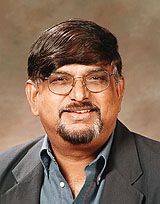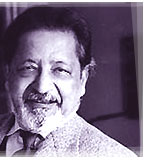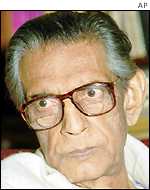|
IAAC
Winter Mela
About Biography
Films
Venue
|
 |
DILIP
K. BASU - Established a world class Archive
and Study Center on Satyajit Ray |
 |
ASEEM
CHAABRA - A freelance writer in New york
city writes on Satayajit Ray |
|
Satyaji Ray (1921-1992)
is considered by many to be India's foremost film director.
Ray was born in Calcutta in 1921 to a distinguished family
of artists, literateurs, musicians, scientists and physicians.
In 1950, Ray was asked by a major Calcutta publisher to illustrate
a children's edition of Pather Panchali, Bibhuti Bhushan Banerjee's
semi-autobiographical novel. On his way back from London,
with little to do on a two-week boat journey, Ray ended up
sketching the entire book. These formed the kernel and the
essential visual elements in the making of Pather Panchali,
Ray's very first film and the film that brought him instant
international recognition and fame. At the Cannes Film Festival,
in 1956, Ray received in absentia, the Best Human Document
Award for this hauntingly beautiful film, its carefully executed
details of joys and sorrows in the life of a little boy named
Apu in a tiny village in Bengal in the 1920s. After the completion
of the Apu Trilogy (1959), regarded as a classic of World
Cinema, Ray continued to work with amazingly diverse and varied
material. During his long career as a film-maker, Ray made
thirty-seven features, documentaries and short films. Ray
received many labels in his lifetime - most of them admiring,
adulatory, some critical. Critics and scholars have marveled
at his craftsmanship, mastery of detail and storytelling techniques.
He has been called the last Bengali renaissance man, the inheritor
and an exemplar of the Tagore tradition, a classic chronicler
of changes being wrought in a traditional society, a humanist,
an internationalist and a modernist. In 1983, Ray suffered
a massive heart attack. He died on April 23, 1992 in Calcutta
after having some 40 films and documentaries and numerous
books and articles to his credit.
|

|
 ____________________________________________________________________________________________
____________________________________________________________________________________________
|

|
DILIP
K. BASU
Department of History,
University of
California,
Santa Cruz, CA 95064
Tel: (831) 423-6553 (h);
(831) 459-2837 or 459-4012 (w);
Fax: (831) 459-3125
dkbasu@
ucsc.edu
|
|
Educated at Calcutta(M.A.), Harvard(A.M.),
and Berkeley(PH.D), Dr. Basu teaches History at the University
of California, Santa Cruz. Prior to coming to UC Santa Cruz,
Professor Basu taught at UC Berkeley and the University
of Michigan. Basu has been a Visiting Fellow at Calcutta
University (1987 and 1993), and Dr. Sun-yat Sen University
in Guangzhou, China (1981). He was elected Chairman of Asian
Studies on the Pacific Coast in 1982.
At UC Santa Cruz, Basu has chaired
the Programs on East Asian Studies and South and Southeast
Asian Studies. He was the director of a UC-Hong Kong University
Collaborative Research Program on Hong Kong and Taiwan.
He is currently chair of the South Asian Studies Initiative
and South and SE Asian Studies Program, and Director of
the Satyajit Ray Film and Study Collection at the University
Library, UC Santa Cruz.
Basu has published in his primary
research areas--nineteenth century China and India. His
publications/books in this area include Nineteenth Century
China: Five Imperialist Perspectives, Symposium on the Opium
Wars. On India, his works include The Rise and Growth of
Colonial Port Cities in Asia, and Social and Economic Development
in India. He was the convenor of the US side of the Indo-US
Calcutta tercentenary conference, which was held in Calcutta
in December 1990. He has edited a volume Art of the Particular:The
Cinema of Satyajit Ray. It will be published by the British
Film Institute in Britain, University of California Press
in the US . and the Oxford University Press in India Basu’s
current research includes a book-length study :of the Great
Calcutta Killings of 1946 which focuses on the turbulent
times of the partition-period Calcutta, and Pidgin Canton,
a study of Sino-Western commercial contact and confrontation
in the early nineteenth century. These research projects
take Basu frequently to Asia, especially to India, China,
and the Pacific Rim.
Basu has received many honors in
his academic life and career. He received the T.D. Kerr
Gold Medal for standing first in the First Class in History
B.A Examination , and the University Gold Medal and the
Presidency College Gold Medal for standing First in the
First
Class in History M.A Examination of the Calcutta University..He
was a Prize
Fellow and a Harvard -Yenching Fellow
at Harvard University ,an Institute of International Studies
Fellow at U.C Berkeley. Basu has been awarded fellowships
and grants by the National Endowment in Humanities, Social
Sciences Research Council, American Institute of Indian
Studies, the Smithsonian Institution, the University of
California Pacific Rim Research Program, Indo-US Subcommission
on Education and Culture, the Ford Foundation, Fulbright
Hays Senior Faculty Fellowship Program, most recently from
the Academy of Motion Pictures Arts And Sciences , and from
the Packard Humanities Institute.Dr. Basu has been the principal
organizer of a number of multidisciplinary national/international
conferences. A few are mentioned: Satyajit Ray in America;
Women in the Cinema of Satyajit Ray; Beyond Orientalism;
Memory and Catastrophe; Comparative Appraisals of Economic
Development in China and India; Calcutta: The City, the
Region and World; Hong Kong: History, Culture and Society.
Professor Basu has a strong interest
in the visual arts. His work on a rare manuscript on the
Bhagavata Purana , a sixteenth century illustrated manuscript
from Assam ,will be published next year by the Indira Gandhi
National Centre For the Arts and Aryan Books in New Delhi.
He has translated Satyajit Ray’s filmscript on Devi
(Goddess) and several other screenplays whch are scheduled
to be published by the British Film Institute in Britain
, and by the Oxford University Press in India and in the
US. He was a consultant to the 64th Annual Academy Awards
for the production of the Satyajit Ray Oscar acceptance
“Remote.” Basu has appeared in person as well
as working as a principal Production Research Associate
in Loni Ding’s NEH-funded documentary, Ancestors in
America: Coolies, Sailors and Settlers.He has directed and
produced two short featurettes for Ray Film & Study
Collection - LUMINOUS LEGACY (on Satyajit Ray and on preserving
his work ), SHARMILA TAGORE .
Dr. Basu is a member of the Association
of Asian Studies and the American Historical Association.
He serves on the Boards of the Museum of the China Trade
in Salem, MA; Cultural Integration Fellowship, San Francisco;
and the Ali Akbar College of Music in San Rafael, CA. He
is an Advisor to the America India Foundation and the Indian
Community Center in Milpitas, CA . He is on the Steering
Committee of a new global initiative : The Promise of India
He is the Founder Trustee of the Ray Society in Calcutta,
India, and the Founder Director of the Satyajit Ray Film
and Study Collection at UC Santa Cruz.
|

____________________________________________________________________________________________
| Aseem
Chhabra is a freelance writer in New York City
who writes on a variety of topics, but focuses on entertainment
and arts stories.
He writes regularly for two Indian-American
outlets -- India Abroad and Rediff.com, the leading news
portal that originates from Mumbai. Aseem has been published
in The New York Times, The Boston Globe, The Philadelphia
Inquirer and The Courier-Journal (Louisville, KY). His byline
has appeared in India in The Telegraph, The Hindustan Times,
The Times of India and the Indian edition of Cosmopolitan
magazine.
|
|
|
In 1983 as a student at Columbia University's
Journalism School, Aseem broke a story based on Satyajit
Ray's allegations that Steven Spielberg's "E.T.: The
Extra-Terrestrial" (1982) and "Close Encounters
of the Third Kind" (1977) were plagiarized from a script
that Ray wrote in 1960s. For the story Aseem interviewed
Ray at his home in Calcutta, Arthur C. Clark -- sci-fi novelist
and a friend of the Bengali filmmaker, who lives in Colombo,
and Marie Seton, the London-based author of "Portrait
of a Director: Satyajit Ray."
Over the years, Aseem has interviewed
an assorted mix of people, especially in the arts -- John
Malkovich, Costa-Gavras, Jim Sheridan, Om Puri, Mira Nair,
Shabana Azmi, Aamir Khan, Ismail Merchant, Gurinder Chadha,
Salman Rushdie, Hanif Kureishi, Subhash Ghai, Padma Lakshmi
and Vijay Tendulkar.
He has covered the South Asian community
in North America from the mid-1980s, during the heyday of
the Khalistan movement, to the hate crimes following the
September 11 terrorist attacks.
Aseem is on the board of the South
Asian Journalists Association. He holds an MS in Journalism
from Columbia University and an MBA from Boston University.
|

|



